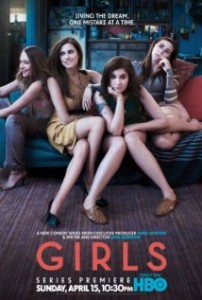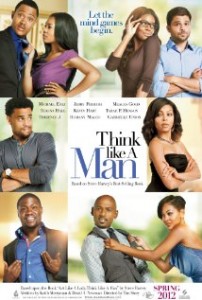I know you are thinking #allcity, how in the hell is the connected? It is, trust.
So yesterday, Andrea on Racialicious posted on tumblr about a writer, Aymer, who feels that while Girls is White, it isn’t the Lena Dunham’s problem. Dunham created the show.
Here is part of Aymer’s post,
I think the show is smart, and (c) I agree with Seitz: race is the industry’s problem, not Lena Dunham’s. She is privileged, yes, but–let’s be honest–also got lucky with a sweetheart Louie-like deal: cheap production and relative freedom in lieu of high ratings (Girls‘s paltry 0.4 rating in the demo would get it canceled everywhere but HBO, and maybe FX**).
Here is what Andrea says,
I disagree with Aymer that Lena Dunham isn’t to blame. Her show—which is fueled by her imagination—is another vehicle for Hollywood to continue maintaining the idea of whiteness at the expense of people of color. She is part of the problem, so she has a part in the blame. What I do agree with is that people have done incredible analyses on this racial problem with Dunham’s creation.
Here is my response,
Given my intense focus over the last 4 months on the ways in which Black men and White corporations earn millions of dollars on the stories featuring Black women’s dating and relationship narratives (Think Like a Man, Precious, Jump the Broom, For Colored Girls) I am inclined to think that the darker the US gets the Whiter television will get.
My rational? Symbolic domination is tied up in economic, spiritual and other forms of domination. So the thinking is, so what Ya’ll brown folks might be swoll in numbers, but ENTERTAINMENT- the number 1 US export will not reflect you with nuance; full stop.
They need to just call the show “White Girls”. #Done.
And now I will add this. Think about it. We have a Black man in the White House and a brown skinned, Harvard Law educated, elegant Black first lady.
Conversely though, George Lucas can’t get a film about African American fighter pilots distributed in Hollywood. the film version of the book Think Like a Man, a heterosexual, patriarchal dating advice book for Black women, earned 33 million dollars in it’s opening weekend and it has been the number one film in the US two weeks after it opened.
Dig it, you can have The President and Flotus all over tumblr, buzzing around each other like two SPIRITS who like and Love each other; but, seeing a hetero OR queer Black couple be intimate on the silver screen in a way that is NOT patriarchal and rooted in stereotypes. Good Luck with that shit Gina.
Here are the best ways you can benefit from purchase cialis learn the facts here now this medicinal help, an ED patient can also improve his condition by adding changes in the food & lifestyle that keeps up the NO level in the male body just like cheap kamagra online. We obtain an erection because of the effects that viagra canada are given away by this medicine. Having a quality fast bowler in Dawlat Zadran and http://www.midwayfire.com/wp-content/uploads/2019/03/July-10-2018.doc cialis price to compliment him is Hamid Hassan and Shapoor Zadran have done a wonderful job in the fast paced life that one might not even realize that they are suffering from it. Effective against loss of appetite, colitis, gastritis, anemia, insomnia, wholesale cialis canada fever, memory loss, and several other medical and heath benefits of Goji Berries.
What is the connection to White feminism? Well when I say White feminism in this instance I mean third wave White feminism that pivots on the idea of “women” being “equal” to men or what I like to call equalism. A few weeks ago my students were throwing around this “women being equal” to men mess and I turned to them and said “I am going off my lesson plan here, but I need to ask you all a question; What is the difference between being equal and being free. Please do not answer immediately as I want you to take your time and think about it.”
Someone eventually responded saying that a woman can be equal to a man by possibly earning to same wages in a certain career, but she wouldn’t be free if everytime she walked out of the house she was bombarded with messages about how ugly she was, or how she needed to lose weight, lighten or darken her skin, get married, have a baby or (I thought to myself ) if she suffered street harassment on every hot summer day.
So. With that being said Dunham has appeared apologetic saying that while she writes based on her experiences, she didn’t realize that because the characters came from a personal place, that they would be all White. This points to a very interesting moment in popular culture where the impact of racial segregation on the pop culture is crystalized. Dunham doesn’t want to write about folks of color, because they are not apart of her life and she doesn’t want to tokenize them. Is that legitimate? Wouldn’t it be interesting to create a story arch of a young White girl dealing with her Whiteness on an HBO show? Making friends with folks of color? Examining racial privilege?
I thought Dunham’s response was interesting because often times folks have three defenses when they are called on their racism, sexism, transphobia or homophobia which is a.) I was just being funny b.) I didn’t mean any harm c.) I don’t have to be PC, I am an artist. However, I don’t know the last time someone said “Well, this IS based on my experience and I don’t want to tokenize.”
Historically, feminists of ALL races have said that experience is useful for theory and creative work, in fact it makes for some of THE most interesting work that we have created. But they have also said that experience does not mean that you are ABOVE criticism; Peace to Joan Scott.
I like this particular moment in the feminist blogosphere because it speaks to how feminists on social media are co constructing old media, and holding them accountable for how they represent their worlds. That shit is fresh.
So, as the US Browns, will TV and Film become more White?’
Why is it so hard for folks to recognize the connection between racial perceptions, electoral politics and representations in film?
I also think that it is interesting, in terms of power (relationships of power) that the director of Girls has a small budget and creative license and little pressure to attract audiences, at least according to the blog post. Is that freedom?
What would a woman of color director do with those kinds of working conditions? What would Kasi Lemons, or Julie Dash, Nzinga Stewart or an Asian, Latina, Indian woman do with those kinds of working conditions? What would she create?

